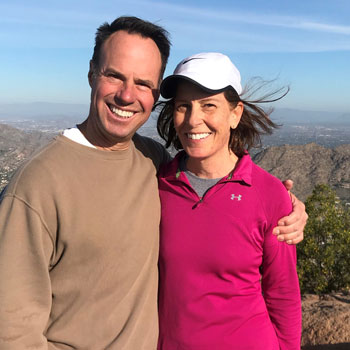Legacy funding is critical as SARRC expands services, maintains buildings, and adapts and grows to meet future needs, say Emily and Kris Kile. That philosophy and the hope that it will set an example for others led them to join Southwest Autism Research & Resource Center’s Legacy Circle. The program recognizes donors who have included SARRC among beneficiaries in their estate plans.
As an attorney who works with families of special needs children and adults, Emily knows the importance of estate planning. After attending SARRC’s Annual Community Breakfast in 2014, she participated in one of the nonprofit’s continuing education programs to learn more about autism. That participation led to sharing her own knowledge with SARRC families in a presentation on ABLE, a tax-advantaged savings program to help pay for disability-related expenses. She now is helping plan even more events as a member of SARRC’s Planned Giving Professional Advisory Council and has presented on many other topics, too.
Autism is very pervasive, but over time the diagnosis has become less frightening because of organizations like SARRC, Emily says. A client’s son, for example, lacked the social skills for success. He was transformed after taking part in SARRC’s PEERs program, pairing those affected by autism spectrum disorder with typically developing peers to teach social and friendship skills, she says.
SARRC works with individuals and their families and has helped take away the fear and bring hope, she says. “I love the fact that SARRC does outreach and education along with treatment and services for those diagnosed with autism, but I’m also impressed with the research behind what works in the real world and the other areas of research that are shaping how we treat autism effectively.”
The Kiles see their legacy gift as providing ongoing support for programs and services as well as enabling SARRC to maintain staff for research and treatment. “Lots of things have changed over time on techniques to reach children,” Emily says. “SARRC needs the resources to continue to provide research-driven programs and services long into the future.”
“Without fundraising, you can’t provide services; without research, you don’t get on the map as a place that is innovative; without education, you can’t bring families the resulting education and training they need,” she says. “This legacy gift allows me to continue helping families in the future by providing the funds to support services for individuals with autism long after Kris and I are gone.”
To learn more about becoming a Legacy Circle member and ensuring the continued vitality and growth of SARRC’s services from one generation to the next, click here.

